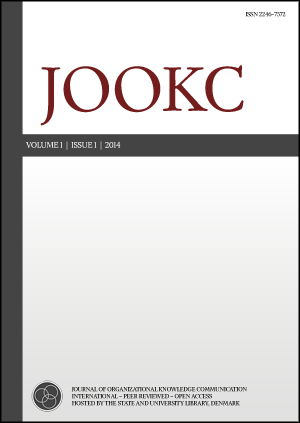Multidisciplinary points of entry to Organizational Knowledge Communication
DOI:
https://doi.org/10.7146/jookc.v1i1.19443Keywords:
Organizational knowledge communication, specialized knowledge, complexity, interdisciplinarity, crossdisciplinarity, multidisciplinarity, polyocularityReferences
Alrøe, H. F. and Noe, E. (2014) Cross-disciplinary Science and the Structure of Scientific Perspectives. Journal of Organizational Knowledge Communication. 1 (1). p. 7-30
Berger, P. and Luckmann, T. (1991[1966]) The Social Construction of Reality. A Treatise in the Sociology of Knowledge. London: Penguin Books.
Casadevall, A. and Fang, F. C. (2014) Specialized Science. Infection and Immunity. 82 (4). p. 1355-1360.
Giddens, A. (1990) The Consequences of Modernity. Cambridge: Polity.
Grant, K. (2011) Knowledge Management – an Enduring but Confusing Fashion. The Electronic Journal of Knowledge Management. 9 (2). p. 1117-1131.
Kastberg, P. (2014) Organizational Knowledge Communication – a Nascent 3rd Order Disciplinarity. Journal of Organizational Knowledge Communication. 1 (1). p. 83-97.
Lueg, K. (2014) Performance Measurement at Universities – Studying Function and Effect of Student Evaluations of Teaching. Journal of Organizational Knowledge Communication. 1 (1). p. 48-61.
Luhmann, N. (1995[1985]) Social Systems. California, USA: Stanford University Press.
Lyotard, J.-F. (1984[1979]) The Postmodern Condition – A Report on Knowledge. Manchester, UK: Manchester University Press.
Mousten, B. and Locmele, G. (2014) Knowledge Representation in Travelling Texts – from Mirroring to Missing the Point!. Journal of Organizational Knowledge Communication. 1 (1). p. 62-82.
Qvortrup, L. (2003) The Hypercomplex Society. Frankfurt am Main: Peter Lang.
Star, S. and Griesemer, J. (1989) Institutional Ecology, 'Translations' and Boundary Objects – Amateurs and Professionals in Berkeley's Museum of Vertebrate Zoology, 1907-39. Social Studies of Science. 19 (3). p. 387–420.
Stehr, N. (1994) Knowledge Societies. London: Sage.
Svejvig, P. and Nielsen, A-D. F. (2014) Leading by Metaphors – A Case Study of a Mega IT Project in a Danish Bank. Journal of Organizational Knowledge Communication. 1 (1). p. 31-47.
Downloads
Published
How to Cite
Issue
Section
License
§1. Object of the agreement and rights
The author guarantees that she/he has the copyright to the work and that this specific publishing does not offend other persons’, organizations’ or companies’ copyright.
- 1.1. The author gives the Journal of Organizational Knowledge Communication a non-exclusive right to publish the work in the electronic version of the non-commercial journal The Journal of Organizational Knowledge Communication. This journal is an open access journal and will be available for free on the internet and as thus available for all internet users worldwide. The work will be published in English.
- 1.2. The journal is published under a Creative Commons license Attribution Non-commercial No derivatives (cc by-nc-sa) http://creativecommons.org/about/license/. This license allows others to download your work and share it with others as long as they mention you and link back to you, but they can’t change it in any way or use it commercially.
- 1.3. The author is the copyright holder and the author agrees to the above mentioned Creative Commons license.
- 1.4. The Journal of Organizational Knowledge Communication is not entitled to transfer the obtained right in this agreement to a third party.
§2. Publishing on the Internet
The Journal of Organizational Knowledge Communication is under an obligation to publish the work within a reasonable time span and within the first year after the manuscript has been accepted for publication. The Journal of Organizational Knowledge Communication is entitled to use the work or parts of the work for marketing purposes.
§3. Proofreading
The Journal of Organizational Knowledge Communication is edited, peer reviewed and proofread by the editors and the international peer review board in collaboration with the author.
§4. Availability on the Internet
The article will be published on the Internet at www.jookc.com.





